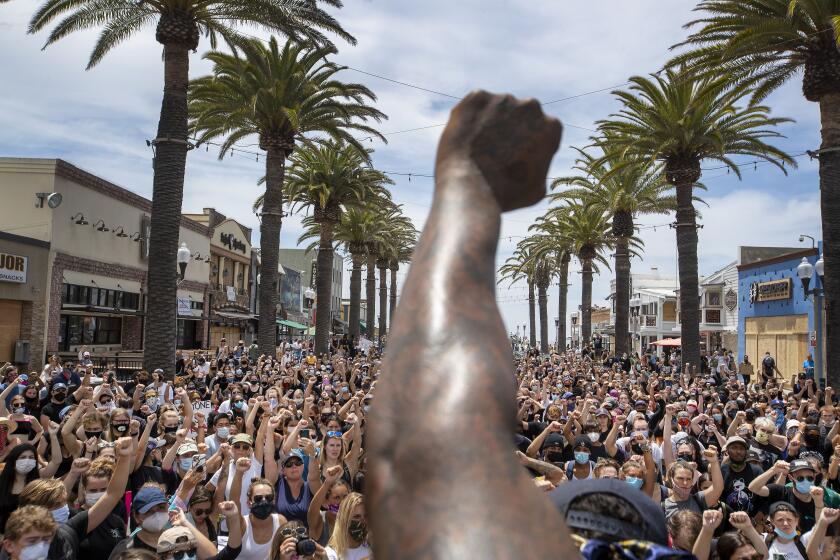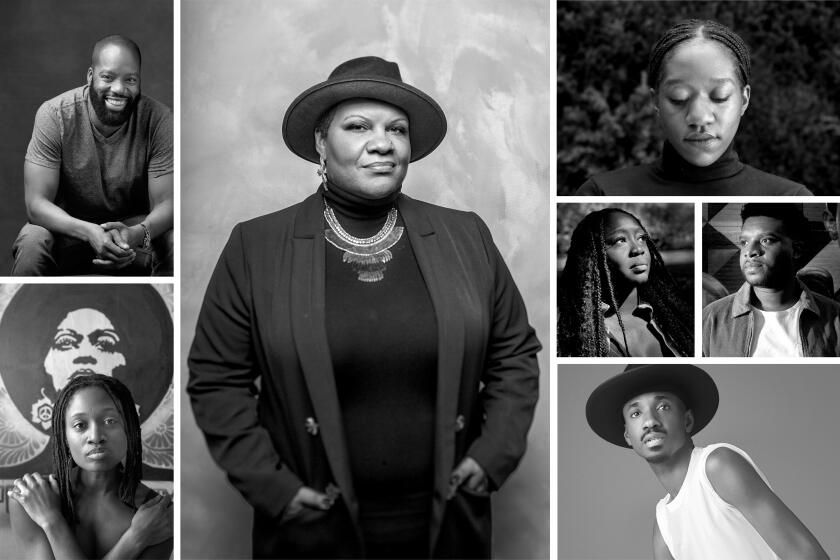‘We’ve always had to battle complacency’: Authors Ijeoma Oluo and Emmanuel Acho in conversation
In Conversation
Ijeoma Oluo and Emmanuel Acho
If you buy books linked on our site, The Times may earn a commission from Bookshop.org, whose fees support independent bookstores.
Ijeoma Oluo and Emmanuel Acho are both children of Nigerian immigrants, and today both are guiding lights in America’s conversation about antiracism. Oluo’s book, “Mediocre: The Dangerous Legacy of White Male America,” is out next week. Acho’s debut, “Uncomfortable Conversations With a Black Man,” was published earlier this month and debuted at No. 3 on the New York Times Best Sellers list.
Beyond those parallels, their paths and approaches to this particular moment, after mass protests over the deaths of Breonna Taylor and George Floyd, couldn’t be more different.
Oluo, a fearless columnist, wrote a prescient 2018 book, “So You Want to Talk About Race.” But as “Mediocre” was being edited, she declined the opportunity to update it in reaction to the pandemic and protests.
“We’re in the natural continuation of what I’ve written about, so I wanted to say, ‘This is part of the disaster I was talking about,’” Oluo explains. “If I had updated this, it would have been a book that was less about patterns and more about the present.”
Acho tackles the issue from another perspective. A former linebacker and current L.A.-based NFL analyst, he had been planning a book on sports psychology before the protests inspired him to instead create a video series — and now a book. Unlike “Mediocre,” it is a direct response to the events of 2020.
“I felt a calling and needed to do something,” he says. “I’m a sports analyst but before that I’m a Black man, and before I’m a Black man I’m a human being, and it’s my job to ... leave the world better than I found it.”
Acho’s book, like Oluo’s debut, serves as an instruction manual for white readers; each chapter begins with a question, then provides context (“Let’s Rewind”), a moment of confrontation (“Let’s Get Uncomfortable”) and concrete advice (“Talk It, Walk It”).
“Mediocre” is about not just race but also gender, and Oluo’s chapters tie the past to the present. One opens with a section on male activists a century ago pushing “socialist feminism” and closes with the intolerance of some Bernie Bros.
What Acho and Oluo share is a belief in the vital importance of frank conversations. The Times recently introduced them over Zoom so that they could have their own discussion about race in America. The transcript has been edited for clarity and length.
Walter Mosley, Luis Rodriguez, the coiner of #BlackLivesMatter and others sketch a hopeful future for L.A. and the U.S. after George Floyd protests.
Who is your intended audience?
Acho: Anyone who wants to be in the fight toward equality and racial reconciliation. Anyone who wants to be equipped to battle their own implicit bias and understand the stereotypes we have faced. My book is geared to white people who want to be allies but don’t know how, don’t have Black friends and don’t want to say or do the wrong thing.
Oluo: My previous book is probably better wed to Emmanuel’s book, being for white people who wanted to have these conversations and are scared. My new book primarily looks at how we put together a white male identity. It’s a diagnostic for people who already get that something’s wrong.
Someone who said “I don’t believe racism exists” is not going to pick up the book and say, “Now I get it.” I do get emails from angry people writing, “This is wrong and that’s wrong,” but they are thinking about it, which they weren’t doing before. That’s a crack in things, but I don’t want to do that work for those people who don’t think there’s a problem.
Acho: I know I can’t change everyone, but I don’t let that stop me from trying to change anyone. My goal is starting with real questions and real context, because you can’t really dispute history. When I bring up the grandfather clause or redlining, you can’t say, “That didn’t happen,” so I tie current events to historical context. If some people think racism doesn’t exist, I would submit that it makes them ignorant. Some people still think the world is flat. It doesn’t make the world flat.
Oluo: [Laughing] That’s funny because I’ve long referred to people who refuse to believe in systemic racism as the Flat Earthers of racial justice.
The poet, essayist and author, most recently, of “Just Us,” discusses the evolving movement toward racial justice with Professor Marcus Anthony Hunter.
How do you balance that historical context with present-day realities and personal experience?
Acho: At times, it’s not enough to just use history because people think it’s dated, so you bring it forth to the present tense — you tie Emmett Till to the story of Amy Cooper and Christian Cooper in Central Park, another white woman lying on a Black man. Let’s not pretend the things that occurred back then are no longer occurring.
Oluo: As a Black person in America, when something happens you are taken back to past stories. We can see these connections. I try to make the connections strong, because there’s a collective gaslighting.
I also quickly found out how connected race and gender often were. It’s the story of power: The people making decisions are always white men, and the brunt of the anger and backlash is always [borne by] any person of color, and especially women of color.
How are your books shaped by your experiences as children of immigrants?
Acho: I’m interested in Ijeoma’s perspective since she’s been in this space way longer than I have, but I wanted to say Black people are not one monolithic group. I didn’t want to offend the same people that I am trying to defend. I’m first-generation American and grew up in a Nigerian-cultured household. I was immersed in white culture at an affluent all-white private school and in Black culture playing football. I’ve had people saying, “You don’t get to speak for me,” and I say, “I’m not speaking for everybody, I’m just speaking my truth to anyone willing to listen.”
Oluo: My upbringing was Black American but I was in regular correspondence with Nigerians and could see the difference. Mine is a Black American story: If we get pulled over by the cops we’re treated the same; when we walk through a store we’re getting followed by the same security guard. But I can’t speak to the intergenerational trauma, so when I get asked to do Juneteenth interviews, I refer them to people who can better speak to that.
We are here because our parents were more privileged than other Nigerians. If we are among the few who get to tell our stories, we have to be vocal and say there are more stories beyond ours.
Two Black women are taking top positions at Simon & Schuster and Knopf. They talk to Rebecca Carroll about language, action, the power of books and the pace of change.
Will the defeat of Donald Trump lead to complacency or “ally fatigue” among white readers?
Acho: There’s still going to be an appetite for someone somewhere, so these books will serve that appetite.
Oluo: We’ve always had to battle complacency. The immediate instinct of white America is to try and find a way to get back to normal — to their normal. Whether that means engaging with the issues for a while to get people to shut up or to feel better about it or whether it means ignoring it, people are saying, “I can’t wait till this is over, till we’re in a better place.”
But friends who are organizers say that if you’re trying to get stuff done in a red state in a Trump administration — where it’s OK to physically attack activists and to say you want to keep things white — the work was almost impossible. Trump meant to embolden and create new generations of white supremacists, so we just had to get him out of office. And that will mean a lot— just to have a level setting that isn’t advocating open, violent white supremacy. If that means fewer people reading our books, that’s OK.
At first, I wanted my book to come out before the election so it could contribute to the conversation, but I’m glad it came out afterward because it’s not about one particular election. This is something we need to focus on all the time.
Your books discuss race as a political and economic creation. Does that give hope for deconstructing the issue or make change more complicated?
Oluo: It makes me aware of the overwhelming power of white male supremacy, but it gives hope too. We’ve seen institutions rise and fall. It’s easier to change an institution than it is to change the hearts and minds of 73 million people. That’s impossible.
Acho: You don’t necessarily take something apart the way you put it together. It may take you hours to build a Lego house, but you don’t have to deconstruct it the way it was built. It’s a new age. Social media exists. We need to deconstruct racism in the best manner which seems fit.
Radha Blank’s ‘Forty-Year-Old Version’ on Netflix highlights racism in the theater industry. We asked 40 Black theatermakers for their stories.
Back in 1968, the Kerner Commission proposed many pragmatic and seemingly achievable remedies to systemic racism — which were largely ignored or not enforced. Is changing institutions a matter of political will?
Acho: I do think it’s a matter of political will, or some sort of government mandate. I don’t think it was enough to outlaw segregation. We should have instead mandated integration. In “Remember the Titans,” Denzel Washington plays a football coach and mandates that the Black and white players room with each other because he did not want the racial issues of the town to permeate his locker room.
Oluo: People say about these issues, “It’s too big, it’s too hard, we have to wait till we have a majority of voters who believe in this.” No, you don’t actually. There’s a purposeful narrative out there telling people it’s too much to ask, that it’s impossible. I’m constantly amazed at the pessimism we have about white male America. They’re supposed to be born leaders but they can’t handle any social change without falling apart. We are capable of coming up with solutions and making them work, and every day we are given evidence showing we can.
More to Read
Sign up for our Book Club newsletter
Get the latest news, events and more from the Los Angeles Times Book Club, and help us get L.A. reading and talking.
You may occasionally receive promotional content from the Los Angeles Times.









